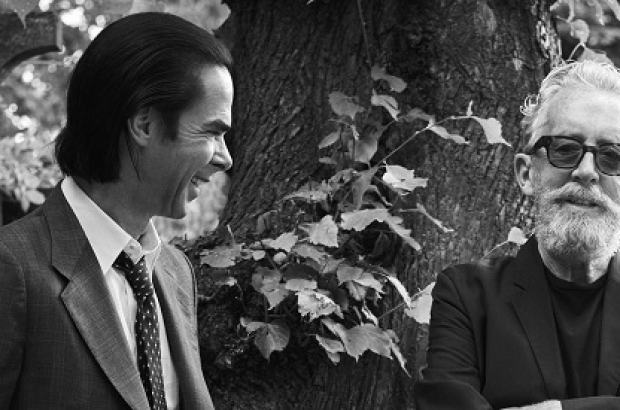- Daily & Weekly newsletters
- Buy & download The Bulletin
- Comment on our articles
Review: Nick Cave and Sean O’Hagan talk grief, God and cancel culture in discussion of book, Faith, Hope and Carnage
Five years on from inviting fans to “ask me anything,” charismatic Australian singer-songwriter Nick Cave opened up about life, death and grief in front of a sell-out audience in Brussels.
Cave, whose sublime work includes the haunting Into my Arms, Red Right Hand and Where the Wild Roses Grow, was at Bozar on the back of a world book tour to promote the paperback edition of Faith, Hope and Carnage. First published in 2022, it was co-written with his good friend, the Irish writer and journalist, Sean O’Hagan, who accompanied him onto the stage.
The work is essentially a transcript of their conversations discussing Cave’s beliefs and thoughts on wide ranging topics from Staffordshire pottery, religion, cancel culture and music to the agony of losing his son, Arthur, in 2015.
Family loss
These discussions intensified during Covid lockdown when O’Hagan and Cave regularly spoke on the telephone. Tragically, while O’Hagan was writing the foreword for the book, Jethro, the second of Cave’s four sons, died after a long struggle with addiction. Two years earlier, Cave’s 93-year-old mother Dawn passed away during the pandemic. He was unable to fly to Australia from his home in the UK due to the former’s strict lockdown rules.
After years of press intrusion and a dislike for the often formulaic method of media interviews, Cave’s relationship with journalists has at best been guarded and uneasy, at worst, combative. But mindful of his global fanbase, Cave created the website Red Hand Files in 2018. It was designed to curate his often misunderstood persona by inviting fans to “ask me anything”. The book tour with O’Hagan is aimed at reconnecting with a live audience and mirroring the intentions of the website.
If speaking of his own grief is by his own admission a cathartic experience, Cave also hopes to help others. A word of warning was given at the start as a member of the audience in Amsterdam a few days earlier had broken down in tears following a harrowing exchange on the subject.
Comfort from religion
The loss of two of his sons has meant grief is a constant presence, which Cave has had to learn to painfully navigate over the years. He told the audience he avoided saying he was at the stage of acceptance – one of the so-called five stages of grief - as he viewed this as complacency. He and wife Susie often sought comfort in religion. Cave recalled their entering a small chapel one day. Suddenly, Susie unleashed her utter despair over her son’s accident on a complete stranger who listened with compassion and offered comfort to the couple. “In what other place could you be allowed to do that,” asked Cave, who pointed out that small acts of kindness could be as effective as grand gestures.
Describing himself as a “non-Christian Christian,” Cave admitted to often having imaginary conversations with lost loved ones. It clearly brought him solace. “We should say things we want to say now because we might not get the chance to say things tomorrow.” Grief, he said, “has reshaped Susie and myself.”
One point of disagreement between O’Hagan and Cave was cancel culture in the arts, particularly involving Israel. Cave rejected any idea of censorship and declared that great art had often been made by “flawed individuals”, stating that everyone should have a voice. His stance on the controversy surrounding Artificial Intelligence was more critical. “We should learn to know when to stop, that it is all enough.”
Bad Seeds reunion
Cave’s polymathic work includes poetry, acting, screenwriting and music composition, but he is best known for his imposing presence as front man of Bad Seeds. He formed the rock band in Melbourne in 1983 along with Mick Harvey and Blixa Bargeld. It was during the height of the band’s fame that be battled with drug addiction. In his book, Cave confessed to O’Hagan he had lived life between two extremes: heroin and God. He said he deeply regretted wasting his time injecting heroin, a drug he battled with some 20 years ago.
Cave was respectful of questions from the 2,000 strong audience, but the latter was audibly and visibly irked by a few who opted for a monologue rather than a bonne fide question. The evening was further marred by the lack of opportunities for the audience to seize the microphone.
One welcome question about a possible Bad Seeds reunion prompted the response that the singer was collaborating with band members and new music was in the pipeline. The quiet sound of approval from the audience following this news and Cave’s declaration of love for Belgian beer, brought the proceedings to a satisfying conclusion.
The paperback version of Faith, Hope and Carnage (with an additional chapter) is available in
bookshops or from Nick Cave’s website, which also offers advice for those struggling wih
depression, loss and grief.
Photo: Nick Cave & Sean O'Hagan © Lynette Garland


















